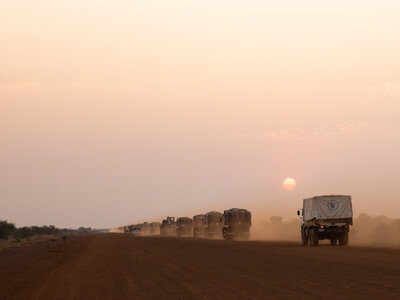South Sudan
- 7.56 million
- people facing Crisis or worse levels of hunger
- 2.1 million-plus
- children under 5 are acutely malnourished
- 11.3 million
- population
South Sudan, the world’s youngest nation, continues to struggle to overcome a multitude of challenges. Conflict, climate shocks, economic instability and the ongoing war in neighbouring Sudan have created a perfect storm of suffering, leaving families unable to access enough food.
Since April 2023, over 1.1 million people fleeing the conflict in Sudan have crossed into South Sudan, placing additional pressure on overstretched communities and humanitarian systems. The World Food Programme (WFP) has supported more than 620,000 of them with fortified biscuits, food or cash assistance, and nutrition support for mothers and young children.
A total of 7.56 million people – over half the population – face Crisis or worse levels of food insecurity or worse, with hunger reaching near-record levels. People in Nasir and Ulang counties in South Sudan are at risk of famine in the coming months, as conflict in Upper Nile State escalates – destroying homes, disrupting livelihoods and impeding the delivery of humanitarian aid.
The situation is particularly dire for children, with over 2.1 million aged over 5 acutely malnourished. A total of 2.8 million children are out of school – more than half of them girls. Female literacy remains alarmingly low at just 29 percent, compared to 40 percent for men – among the lowest rates in the world.
Food assistance remains essential to averting a humanitarian catastrophe. But it must also serve as a bridge to long-term recovery. WFP is working with local civil society and empowering communities – especially women and girls – to build resilience, support peacebuilding and foster self-reliance in the face of relentless adversity.
What the World Food Programme is doing in South Sudan
-
Food assistance
-
WFP works to ensure that vulnerable people affected by conflict, displacement, climate shocks (flooding and drought) and economic crises can meet their food and nutrition needs. This includes conditional or unconditional food distributions and, where possible, cash transfers.
-
Nutrition
-
Livelihood support
-
School meals
-
Logistics support
South Sudan news releases
Go to pageFind out more about the state of food security in South Sudan
Visit the food security analysis pageOperations in South Sudan
Contacts
Office
WFP Country Office South Sudan, Jebel Kujur Office, Juba, South Sudan
Juba
South Sudan







